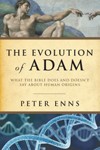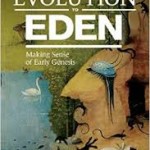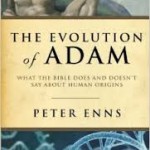 Today’s post is by Karl Giberson and is adapted from his newly published Saving the Original Sinner: How Christians Have Used the Bible’s First Man to Oppress, Inspire, and Make Sense of the World
Today’s post is by Karl Giberson and is adapted from his newly published Saving the Original Sinner: How Christians Have Used the Bible’s First Man to Oppress, Inspire, and Make Sense of the World.
Giberson teaches Science & Religion at Stonehill College and a key figure in the science/faith dialogue. His other books on on the subject include Saving Darwin: How to Be a Christian and Believe in EvolutionThe Wonder of the Universe: Hints of God in Our Fine-Tuned World
and (with Francis Collins) The Language of Science and Faith: Straight Answers to Genuine Questions
.
**********
The notion of a moral boundary separating good from evil frames early Christian disputes about the meaning of Adam’s sin. Their reflections on the nature of sin were largely considerations of where to draw this boundary.
Was everybody evil in the same way, as Alexander Solzhenitsyn suggested when he penned these memorable lines: “The line separating good and evil passes not through states, nor between classes, nor between political parties either — but right through every human heart”? Or did sin emerge from entirely different sources?
Were the white lies told by everyone to protect other’s feelings rooted in the same human flaw as the cruelty of the Roman executioners who made sport of killing Christians? Perhaps simple human imperfections could account for the former, while the latter needed something more dramatic, like demons, which seemed to be everywhere in the early Church.
Paul had famously connected Adam’s sin to Christ’s death suggesting that the latter erased the former for everyone—white liar and executioner alike—but the nature of the connection he drew was ambiguous and admitted different interpretations of what happened when Adam sinned. It would be centuries, in fact, before Augustine would explain this connection as “original sin,” insisting that Adam’s transgression was passed on to everyone.
Augustine, we might say, moved the boundary between good and evil until it ran through everybody, and not merely in the space between the good guys and the bad guys, between the Christians and their persecutors.
The key question on the table during the centuries leading up to Augustine was: Do we differ from the pre-fall Adam because he sinned? Did he pass something down to us making it impossible for us to avoid sin? Or do we have the same chance to avoid sin as Adam did?
This was a lively question and early Christians were of two minds. On the one hand, we may all be like Adam and Eve in our capacity to resist temptation. The story of Adam may simply be our story, reflecting the real challenges—but not impossibility—of resisting temptation. Adam was a primordial Everyman, falling short despite his best intentions, a dramatization of what we would have done in his situation and what we must avoid in our situation.
On the other hand, God’s response to Adam’s sin was not confined to Adam. The ground was cursed. Abel the farmer must have had a harder time of it because of his father’s sin although no mention is made of this. Childbirth became painful for all women—not just Eve—and serpents were reduced to crawling on their bellies. Adam’s descendants clearly lived in a different world and possibly were different from the first man.
Did Adam do something that changed him in ways that were passed on to his descendants? Are we now powerless to resist temptation? Or are we still free to not sin, and live perfect lives, as the Genesis story suggests was the case for Adam?
Hebrew reflections prior to Paul suggest that Adam passed nothing on to his offspring. Subsequent sin—Cain’s murder of Abel, the wickedness of Noah’s generation or the folly at the Tower of Babel—is never described as inevitable. Adam’s sin is never mentioned again in the Hebrew Scriptures, which is very curious, given the importance now attached to it.
Paul, as we now see clearly, embellishes the Adam story in ways that certainly stretch the “authorial intent” of the writer(s) of Genesis. He saw things in the story—or maybe read them into the story—that nobody else had seen. But Paul nowhere suggests that Adam’s unfortunate choice was made by a “pre-fallen” human. And, significantly, Paul also does not argue that subsequent human sin is inevitable because of what Adam did.
The four “biographies” of Jesus—Matthew, Mark, Luke, John—written years after Paul’s letters all deal with good and evil but they set up the tension as between Satan and Christ, not between a sinful nature and knowledge of the good.
Adam, by these lights, seems to be the first sinner only in the sense that Neil Armstrong was the first human to step onto the moon. Something extraordinary occurred when Armstrong took his “one small step for a man” but that event certainly did not transform humanity.
In contemporary debates over the historicity and theological significance of Adam we would do well to distinguish the Adam of Genesis, the Adam of Paul, and the Adam of Augustine. We must certainly avoid reading Augustine’s Adam back into Genesis as if that is our only interpretive option.















